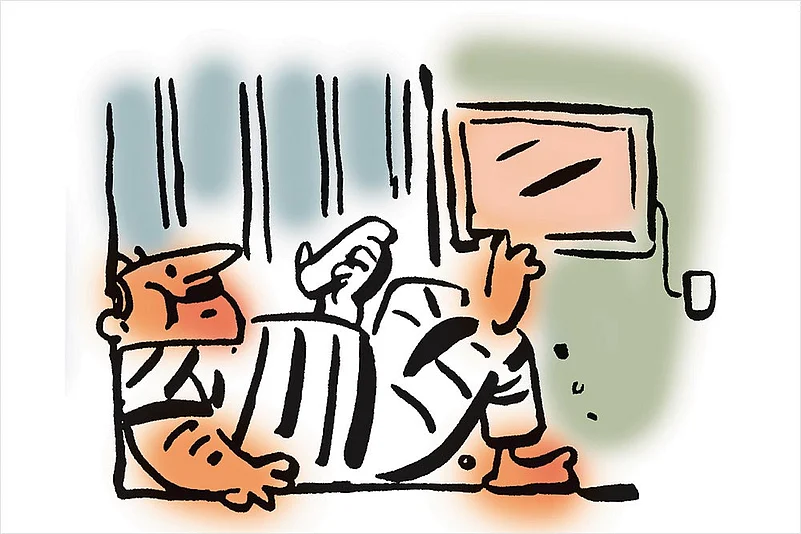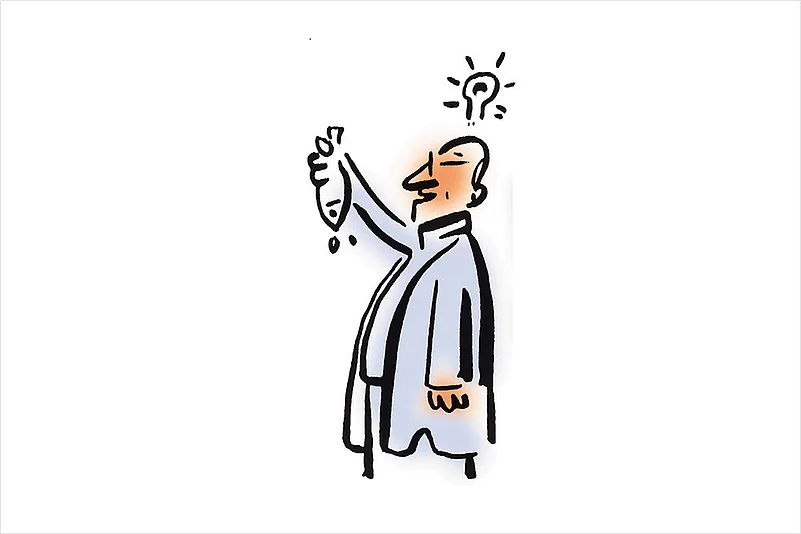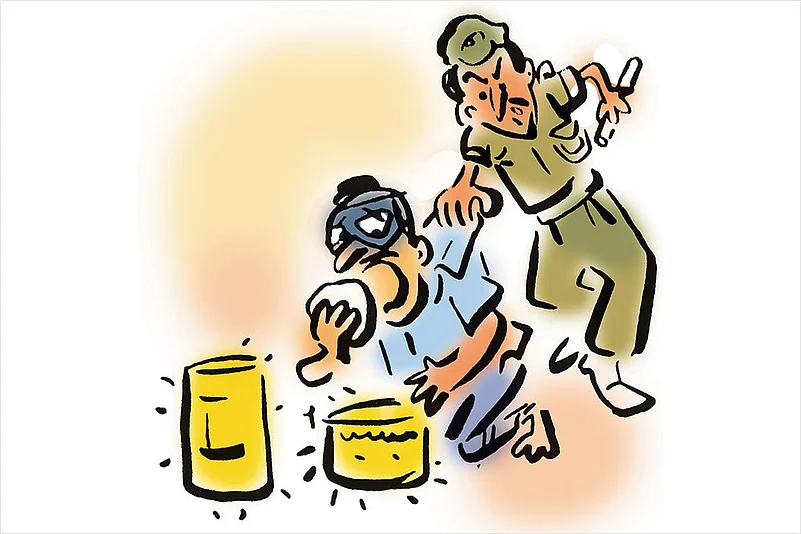The Great Tiffin Robbery
It could be one of those tired expressions along the lines of ‘eat like a king’, localised for the Indian market by the subcontinental franchises of Orwell’s betes noires: ‘nibble like a nizam’. But 23-year-old Mohammed Ghouse and Mohammed Mubeen, 24, took a literal approach when they stole a diamond-studded, golden tiffin box belonging to the last Nizam of Hyderabad, as well as a gold cup-and-saucer set and gold teaspoons, from the Nizam Museum. When the Hyderabad police caught them, they found that the pair had been eating from said Vessel each day. Mubeen had insinuated himself into the museum via a ventilator, while Ghouse was the lookout. They nearly stole a gold-cased Koran before they heard an azaan, which they took as a divine warning to leave the book be.

Infotainment For Inmates
Uttar Pradesh’s jail inmates will soon be able to watch telly from the discomfort of their barracks. The state is in the process of acquiring around 900 LED television sets to be installed in UP’s prisons, one for each barracks. A budget of Rs 3.5 crore has been allocated for this initiative, according to ADGP (Prisons) Chandra Prakash, who was also quoted as saying, “Jails are also reform centres. Of course, when they are inside jails, inmates need entertainment. But that is not the sole objective. We want to push programmes for their reformation.”It’s an attempt to improve the quality of life in prisons in a state that sees a large number of ‘unnatural deaths’—UP’s jails saw 21 such deaths in 2015, the highest number in the country according to that year’s National Crime Records Bureau report.

Nothing To Declare
Chief Justice of Pakistan Mian Saqib Nisar was unpleasantly surprised when he was recently informed by the Federal Investigation Agency (FIA) that 125 citizens of his country have around $150 billion of properties and other assets—undisclosed in wealth statements given to the Federal Bureau of Revenue—parked in the United Arab Emirates. This is in spite of an amnesty granted by Pakistan’s previous government that allowed people to declare undocumented assets by paying a five per cent tax. Notice has been issued to these asset holders, amid ongoing cases and inquiries, that are also looking into the London properties of 225 Pakistani nationals. The FIA is pushing to expand the net to other countries as well.

‘A’ Bad Spell
Akhilesh Yadav is apparently being besieged by an erstwhile ally: the letter ‘A’. A ‘close aide’ to the Samajwadi Party president was quoted in a newspaper as saying, “We are consulting a numerologist and an astrologer to find out about this ‘A’ crisis. In the past, ‘A’ has always been favourable for Akhilesh, be it Amitabh Bachchan or the Ambanis, but now there seems to be a change in planetary positions, and ‘A’ is a troubling factor.” ‘A’ is the first letter of Akhilesh’s own name and those of two of his children, but it has turned traitor to side with (currently problematic) SP leader Azam Khan and party grandee-turned-critic Amar Singh

A Delectable Helix In Mustard
The human genome is old news. Scientists in Bangladesh have reportedly sequenced the complete set of genes of a being with great cultural cachet: the Hilsa. Two teams, one from Bangladesh Agricultural University and one from the University of Dhaka tackled the project separately, and ended up informing the press of their breakthroughs. Mapping the genome—the precise order in which the nucleotides that make up an organism’s DNA are arranged, which determines many properties—will improve our knowledge of the Hilsa, to be used for conservation efforts and for making it—a 100th of the country’s GDP comes from Hilsa—multiply more fruitfully.
Knight In Muddy Boots
A man giving his wife a piggyback over a bit of muddy terrain isn’t necessarily news—but it is when it’s Tshering Tobgay, former premier of Bhutan, doing it. Especially if he tweets, “Not as dashing as Sir Walter Raleigh, but a man’s gotta do what a man’s gotta do to keep his lady’s feet clean”—a reference to an apocryphal tale about the Elizabethan swashbuckler spreading his expensive cloak over a puddle so that his queen could walk across. It has been retweeted 1,323 times. Tobgay served as PM till last month, but his party was eliminated during the first round of the ongoing polls.
Conservation Incarnation
Are we in Krita Yuga, after all? A saviour has descended in the form of the Kurma Avatar. To put it prosaically, an idol of Vishnu in his turtle form has been installed near the pond at the Lota Devi temple in Bengal’s Jalpaiguri to protect the resident (mortal) Indian Roofed Turtles (Pangshura tecta). Visitors have hitherto had a habit of flinging offerings, including incense sticks and oil, into the pond, threatening around 20 turtles. But now, “This idol is placed just outside the fenced area, where devotees can place their offerings, rather than directly pollute the pond,” says Shyama Prasad Pandey, secretary of the Society for Protecting Ophiofauna & Animal Rights (SPOAR).
Approaching Captaincy
For more than two decades (1964 to 1985), Brazil was under the authoritarian rule of the military. Now, several decades later, another army man, Jair Bolsonaro, is getting ready to become its new ruler.
In terms of political affiliations, the country has witnessed a wide spectrum of regimes since its emergence as an independent nation from Portuguese colonisers. But after the domination of the leftist government of the Workers Party, the swing of the political pendulum seems more inclined towards the right. In the last 16 years, Brazilian politics has witnessed a lot of drama, with the impeachment of two presidents and a 12-year jail term for a third—one of the most charismatic and popular leaders, Luis Inacio Lula da Silva, known simply as Lula to his supporters and the outside world. In a countrywide anti-corruption drive known as ‘Car Wash’, initiated by sections of the Brazilian judiciary, over 100 politician and senior government official and businessmen were also arrested along with the former president.
But the political drama has continued to the run-up to next month’s presidential election with the stabbing of Bolsonaro, a former army captain and the right- wing candidate who is leading the race, in an election rally early this month. Bolsonaro has been a vocal supporter of torture and guns, and had been extremely disparaging in his comments against Blacks, women and homosexuality. Yet, he continues to be the most popular among the other candidates in the fray.
Lula, who left office in 2010 with 87 per cent popularity, had initially thought of contesting the polls from jail. But he withdrew after a court’s ruling invalidated his candidature. Instead, he has now decided to extend his support to his party colleague and former Sao Paolo mayor, Ferdanando Haddad. But Haddad, despite his popularity as a professor when he once taught political science in the University of Sao Paulo, along with Lula’s backing, had been unable to rally all the Workers Party members behind him.
Bolsonaro, on the other hand, has continued to campaign from his hospital bed. The wide coverage of the attack and his recovery has given him huge amount of publicity. But, despite the unfairness of all this, his political opponents have refrained from criticising him since none of them want to be seen as “unsympathetic.” His approval ratings are now above 26 per cent and he has young, educated and wealthy voters behind him. Brazil, after all, may get the former captain as its next president.
Illustrations by Sajith Kumar


























